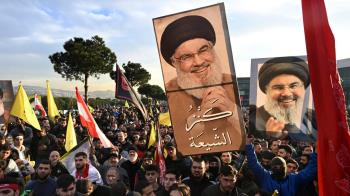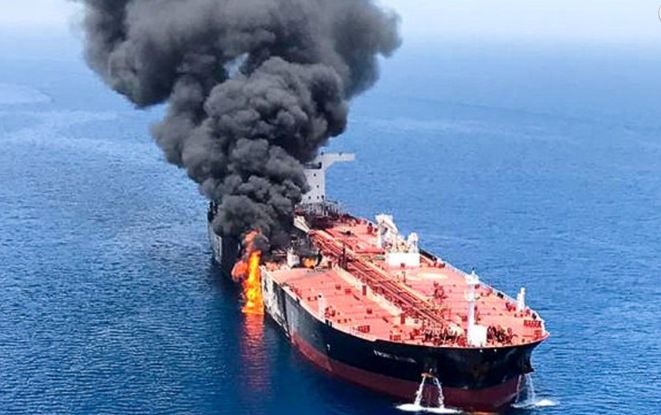Alwaght- The US's allies and Western analysts cast doubt on a Video footage released by the US military to blame Iran for the recent attacks on two oil tankers in the Sea of Oman.
Less than a day after the US Central Command (CENTCOM) released the video late Thursday purportedly showing "Iranian sailors" removing a mine from the Japanese-owned Kokura Courageous' hull earlier in the day, European governments — except for Britain — have so far refused to accept the US' narrative that Tehran was to blame for the "suspicious" attacks.
They are reluctant to accept the White House’s claims at face value, and do not want to provide Washington with any pretext for war.
German Foreign Minister Heiko Maas said on Friday the video is not sufficient to prove the US claim that Iran was behind the attacks.
"The video is not enough. We can understand what is being shown, sure, but to make a final assessment, this is not enough for me," Maas, who was in Iran earlier this week on an official two-day visit, told reporters in Oslo.
Nathalie Tocci, a senior adviser to European foreign policy chief Federica Mogherini also rejected the US allegations, saying, “Before we blame someone, we need credible evidence.”
Iranians are deeply rational actors, she said. And for Iran to have attacked a Japanese ship when the Japanese prime minister was in Tehran “is not an especially rational thing to do.”
In the video released, a small boat is shown coming up to the side of the Japanese-owned tanker. An individual stands up on the bow of the boat and can be seen removing an object from the tanker's hull. The US claims that the object is likely an unexploded mine.
"At 4:10 p.m. local time an IRGC Gashti Class patrol boat approached the M/T Kokuka Courageous and was observed and recorded removing the unexploded limpet mine from the M/T Kokuka Courageous," the CENTCOM said in a statement.
The claim, however, was soon rejected by the Japanese ship's operator, whose president said on Friday its sailors on board the Kokuka Courageous saw "flying objects" just before the attack, suggesting the tanker wasn't damaged by mines.
"The crew told us something came flying at the ship, and they found a hole," President Yutaka Katada of Kokuka Sangyo told a press conference in Tokyo. "Then some crew witnessed the second shot."
The video was also disputed by Western investigative journalists and defense analysts.
Investigative historian and journalist Gareth Porter said he had "written to the CENTCOM media desk to ask why the video the command has released does not show what happened before the moment something is removed from the side of the boat."
I have just written to the CENTCOM media desk to ask why the video the command has released does not show what happened before the moment something is removed from the side of the boat. I urge all journalists covering the incidents to do the same. It's vital for full context.
— Gareth Porter (@GarethPorter) June 14, 2019
The investigative journalism website Bellingcat also wrote that "there's currently no evidence to verify what was removed from the side of the vessel was a mine, and there's no evidence at the moment about who placed it there, so claiming it was a mine placed by the Iranians is pure conjecture at this point in time."
And again, to be clear, there's currently no evidence to verify what was removed from the side of the vessel was a mine, and there's no evidence at the moment about who placed it there, so claiming it was a mine placed by the Iranians is pure conjecture at this point in time.
— Bellingcat (@bellingcat) June 14, 2019
Some analysts and observers even questioned the authenticity of the video, arguing that the US military has edited the video to make it misleading.
I’ve reviewed 100+ hours of BDA and I can tell you this, the Navy edited this video and it’s now misleading.https://t.co/B3nsBB9e0o
Missing: data (skew angle, speed, GEO coordinates, etc), color (converted to black and white), platform, pilot commentary, and it’s too zoomed in
— Operation Wolverines (@OpWolverines) June 14, 2019
UN chief urges independent inquiry
UN Secretary General Antonio Guterres has called for an independent probe into Thursday’s attacks in the face of US efforts to frame Iran.
Guterres underlined the need for an investigation to establish the facts about the attacks, adding that he believed only the Security Council could order a UN inquiry.
“It’s very important to know the truth and it’s very important that responsibilities are clarified. Obviously that can only be done if there is an independent entity that verifies those facts,” he said.
Corbyn urges UK to reduce tensions
The UK’s opposition Labour leader, Jeremy Corbyn, has urged London to try to reduce tensions in the Persian Gulf following the oil tankers incident in the Sea of Oman.
The United States has blamed Iran for attacks on two oil tankers in the Sea of Oman on Thursday and Britain followed suit with Foreign Secretary Jeremy Hunt, accusing Tehran of “destabilizing” the region.
“These latest attacks build on a pattern of destabilizing Iranian behavior and pose a serious danger to the region,” Hunt said in a statement.
Few hours later, however, Corbyn criticized the British government for making accusations against Iran “without credible evidence.”
Britain should act to ease tensions in the Gulf, not fuel a military escalation that began with US withdrawal from the Iran nuclear agreement. Without credible evidence about the tanker attacks, the government’s rhetoric will only increase the threat of war.
— Jeremy Corbyn (@jeremycorbyn) June 14, 2019
False-flag operation
The attacks on Thursday morning sent shock waves through the world which was awaiting the news of a meeting between Japanese Prime Minister Shinzo Abe and Leader of the Islamic Revolution Ayatollah Seyyed Ali Khamenei in Tehran.
François Heisbourg, a French defense analyst, told The New York Times there’s a lot of suspicion among US allies in Europe about American motives.
“The maritime milieu is especially susceptible to manipulation — remember the Gulf of Tonkin,” a dubious report of naval hostilities that President Lyndon B. Johnson used to escalate the war in Vietnam. And then, he said, are the bitter memories of the Iraq war, which was based on faulty intelligence and badly split Europe.
Heisbourg said there are several potential beneficiaries from the attacks, among them Washington hard-liners like the national security adviser, John Bolton, and "wild ones" in Saudi Arabia or in the UAE.
Israel Lobbyist suggests False Flag attack to start war with Iran.
Patrick Clawson of the influential neo-con Washington Institute for Near East Studies OPENLY suggests that the US should do this with Iran. Gives historical examples.#NoWarWithIran#HandsOffIran pic.twitter.com/h2bJlb9qIm
— Currie Dobson (@Ventuckyspaz) June 14, 2019
Back in April, Iranian Foreign Minister Mohammad Javad Zarif had warned that an "accident" could be plotted to take place so as to trigger a broader crisis.
Speaking in an interview with Reuters at the Iranian mission to the United Nations in New York on April 24, Zarif said the so-called “B-Team,” including Bolton and Israeli Prime Minister Benjamin Netanyahu, could goad Trump into a conflict with Tehran.
In a tweet after the recent incidents in the Sea of Oman, Zarif referred to his earlier warnings, and said, "The B-Team is sabotaging diplomacy (including important and constructive visit of PM Shinzo Abe) and covering up economic terrorism by the US against Iran."
That the US immediately jumped to make allegations against Iran—w/o a shred of factual or circumstantial evidence—only makes it abundantly clear that the #B_Team is moving to a #PlanB: Sabotage diplomacy—including by @AbeShinzo—and cover up its #EconomicTerrorism against Iran.
— Javad Zarif (@JZarif) June 14, 2019
Last month, the Trump administration had accused Iran of being behind a similar attack on four oil tankers in the Persian Gulf while independent analysts blamed US and Israeli intelligence agencies for carrying out a false flag operation in order to ignite a conflict in the Middle East region.
Last week, the United Nations Security Council held a meeting on the vessel attacks near the UAE port of Fujairah, but member states refused to blame any party despite Abu Dhabi's claim that a "state actor" was behind the incident. Russian Deputy Ambassador Vladimir Safronkov told reporters that no evidence on Iran's alleged link to the attacks were presented during the briefing.
Days before the Security Council briefing, Bolton had vowed to present to the UN evidence on Iran's involvement in the Fujairah attacks, but he didn't.
Following those allegations, Iran officially warned about the use of fake intelligence, similar to those which resulted in the US invasion of Iraq in 2003, to push Washington toward a war with Tehran.
“Those who were responsible for the Iraqi invasion back in 2003 are the same people who are trying to create a conflict in our region," Iranian ambassador to the UN Majid Takht-Ravanchi said in May, referring to Bolton's role in the Iraqi invasion.



























